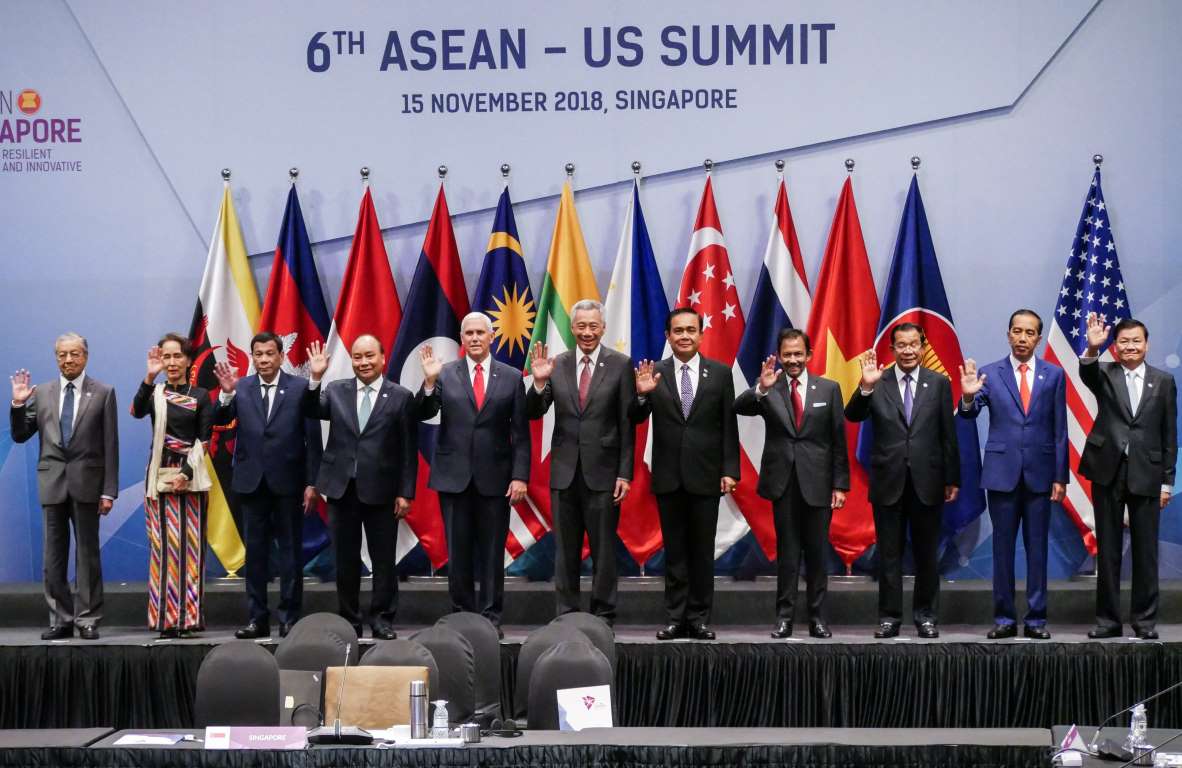
TIME reports: "The U.S. and China offered rival visions for the Asia-Pacific region Thursday at a summit of Southeast Asian nations whose economies and strategic interests are deeply entwined with both powers, with Vice President Mike Pence saying there was no room for 'empire or aggression' in the region. Pence stressed the 'steadfast and enduring' American commitment to the Indo-Pacific region as he met with leaders of the Association of Southeast Asian Nations during their annual summit in Singapore. 'Our vision for the Indo-Pacific excludes no nation. It only requires that every nation treat their neighbors with respect, they respect the sovereignty of our nations and the international rules of order,' Pence said in a veiled swipe at China's growing influence and military expansion in the South China Sea. He is standing in for President Donald Trump at the ASEAN meeting and another summit later this week in Papua New Guinea. The ASEAN meetings focus on enhanced trade and security in a region of more than 630 million people. While in Singapore, Chinese Premier Li Keqiang has sought to reassure China's neighbors over its expanding reach, both economic and military, across the region."
The Wall Street Journal reports: "Retail sales are nose-diving, credit growth is weakening, and tariffs on $200 billion of Chinese exports to the U.S. are about to more than double. Surely it's time for another big China stimulus? Don't be so sure. One reason: The previous round of stimulus beginning in 2015 and 2016 was larger than most investors appreciate, and parts of China's economy are still benefiting. For evidence, look no further than China's bubbly property market. The strength and length of China's business cycle has wrong-footed many analysts because they were watching credit growth—which has nearly always led the critical housing cycle previously. This time things are different: Overall credit growth has been decelerating for nearly two years. Even so, housing prices in so-called 'third-tier' cities were up almost 10% on the year in October, the fastest rise since at least 2011. And despite slightly slower property investment, average year-over-year output growth of key housing-related products including cement, metals, glass and electricity hit a four-year high of 8%."
The New York Times reports: "Chen Deliang, wearing an orange tunic, a gold watch and fluffy bedroom slippers decorated with snowflakes and the word 'Love,' stood proudly in the 130,000-square-foot temple he had built. He had filled it with pagodas, Buddhas and a towering statue of a local goddess. There were several wings, with bedrooms and an office where he practiced calligraphy. A chain smoker with a wispy beard, he initially hesitated talking about his path to unimagined wealth, but eventually relented with a matter-of-factness that betrayed no sense of smugness: 'I was the first person to create everything.' Nearby his family and friends owned mansions, many several stories tall, rising above the unpaved roads and sweet potato fields of the village of Dongzhuang in southern China. They exuded a gaudy opulence — elevators, minarets, gilded gates, fountains with Greek gods. Just days before the Lunar New Year, the most important festival in China, Ferraris and Lamborghinis lined their driveways."
- 2018-11-14 Why Young Pakistanis Are Learning Chinese
- 2018-11-13 Xi Expands China’s Footprint in the Pacific While Trump Stays Home
- 2018-11-12 China calls for open world economy but work remains on landmark trade pact
- 2018-11-11 Bilateral ties, military movement key points at US-China meeting
- 2018-11-09 Forget the trade war, China's economy has other big problems
- 2018-11-08 Trump’s Tariffs Have Fully Kicked In—Yet China’s Exports Grow
- 2018-11-07 Here's what the US election results mean for Trump's trade war with China
- 2018-11-06 China open to trade talks with US, says Wang Qishan
- 2018-11-05 Xi tells the world China will boost imports while swiping at Trump’s ‘law of the jungle’
- 2018-11-04 Trump-Xi Trade Deal Is Likely to Begin Rather Than End at G-20
- TIME China and the U.S. Offer Rival Visions of the Pacific at the ASEAN Summit
- The Wall Street Journal The Other China Stimulus Is Still Goosing Growth
- The New York Times Scandals Catch Up to Private Chinese Hospitals, After Fortunes Are Made
- The Washington Post What we really know about China's Reform and Opening Up
- CNN Communist Party cracks down on China's famous Peking University
- The Wall Street Journal Pence Calls for an Indo-Pacific Region Free of Chinese 'Aggression'
- The New York Times Trump to Raise North Korea Sanction With Chinese Leader, Pence Says
- CNBC No quick win for China on trade despite Kudlow-Navarro dispute, experts say
- Bloomberg China's Influence on Display as Leaders Converge on Island Nation
- Business Insider Trump's trade war with China just ended one car manufacturer's incredible 46-month streak
- CNN How lessons from Rwanda could help China fix its myopia crisis
- The New York Times Lawmakers Push Trump to Act Against China on Uighur Detention
- CNBC US and China conflict goes way beyond trade, says Ray Dalio, founder of world's largest hedge fund
- The Diplomat Xi Arrives in Papua New Guinea for First-Ever Visit by Chinese President
- The National Interest Report: America Could Lost a War Against Russia or China
- The Diplomat Chinese Nationalism: The Dog That Barks in the Night
- Foreign Policy Asia Needs Pence's Reassurance
- The Diplomat Why Didn't China Honor Its World War I Dead
